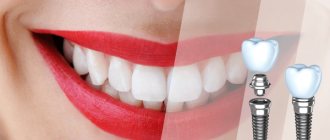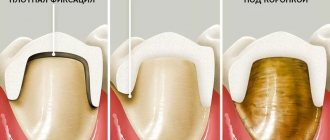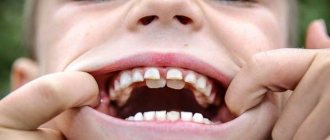Toothache is one of the most severe types of pain that a person can experience. Toothache always occurs at the wrong time, if at all we can talk about the right moment. To effectively combat it, you need to understand its causes. What causes acute toothache? How long can you endure and how to calm the pain?
Toothache ruins work plans, forces you to give up entertainment, takes over your consciousness and subjugates you to your will. “Well, why now, what happened?” you think, trying to understand what is happening, and you are on the right track, because it is by searching for the real cause of toothache that you need to begin its treatment.
The cause of toothache can be:
Thinning of tooth enamel as a result of its demineralization due to a lack of vitamins and microelements such as calcium, phosphorus and fluorine. In this case, toothache is aching in nature and occurs mainly during meals, especially sweets, or when drinking cold and hot drinks.
Scuffs, cracks and chips of teeth - all of them are of traumatic origin and are manifested by special sensitivity of the teeth to temperature changes and the chemical effects of food.
A wedge-shaped defect in the cervical area of a tooth can also cause pain that occurs due to mechanical, thermal and chemical irritation of the tooth.
Caries. Superficial caries does not cause pain, but deep caries can cause anxiety. Carious pain is rarely severe, more often it is aching in nature, occurs mainly when food gets into the cavity formed in the tooth and disappears almost immediately after its cleansing.
Pulpitis is the result of deep caries and a consequence of the spread of the inflammatory process to the soft tissues of the tooth - the pulp. Pain with pulpitis occurs both when eating and regardless of it, for example, at night. It is twitching and so strong that it seems as if not just one tooth hurts, but the entire jaw or even half of the head.
Periodontitis is characterized by inflammation of the connective tissue that surrounds the roots of the tooth and holds the tooth in place. The pain with periodontitis is not severe, but progresses with load on the tooth and is accompanied by a feeling as if it has grown and become taller than the rest of the dentition.
The formation of an abscess , or purulent abscess, at the root of a tooth is initially accompanied by aching toothache, which intensifies when the jaws are closed. Then, as the abscess grows, the pain intensifies, becomes tugging, bursting, the gum swells, and soon a protrusion becomes noticeable on its surface - the abscess itself.
The causes of pain in the teeth can be very far from the oral cavity. For example , pain may radiate to the teeth and jaws during angina pectoris and myocardial infarction . The source of pain can be diseases of the ear, nose and throat, injuries of the cervical spine, pathology of the temporomandibular joint, nerve diseases and malignant tumors of the maxillofacial area.
Sometimes tooth pain is psychosomatic in nature , that is, it occurs as a result of severe stress and is not associated with any diseases.
Pain after dental treatment, which lasts up to three days, is a completely natural reaction of the tooth to medical manipulation. The occurrence of pain after tooth extraction is the result of natural trauma to the tissues surrounding it.
Why is it harmful to endure pain?
Pain is the body's natural response to injury, inflammation, or any possible discomfort. But tolerating it is unnatural and even dangerous. One of my friends, having read articles on the Internet that pills are a terrible chemical (even those that are supposedly of plant origin), which will take years to remove from the body (in women, the blood is renewed once every three years, and in men - once at the age of 4), categorically refused to use them once and for all. Firstly, she believes that in this way she has decisively improved her lifestyle, secondly, she has strengthened her position for planning and giving birth to healthy offspring, and thirdly, she has simply and simply cleared her karma.
However, every time she, like any living, but, alas, mortal person, has something in pain, she curls up into a donut, and the whole world ceases to exist until everything passes or is at least somewhat relieved. . To be honest, this is a very sad sight, especially when you not only know, but also see that a person is suffering, and you cannot help in any way, because they do not want to accept your help.
Many can rightly note that our ancestors, who had not yet reached scientific progress, did not know about any medicines or medicines at all - they drank herbs, made lotions and lived up to a hundred years. Yes, but our ancestors also breathed fresh air, did not use equipment that emitted electromagnetic waves harmful to the body, and ate everything only natural - without GMOs and preservatives. They didn't really need the pills. And if there is poison, there must be an antidote - even in the form of a less powerful poison.
But pain cannot be tolerated for several reasons. Firstly, pain signals that the body needs help, and by ignoring it, we can trigger the state of any disease, turning it into a chronic form. Secondly, a painful spasm has a destructive effect on brain cells and nerve endings (which is why a person in pain is often irritable and lashes out at others). The heart and blood vessels are also affected. And thirdly, the psycho-emotional state of a person suffering pain leaves much to be desired.
We suggest you familiarize yourself with White spots in the mouth of an adult
A headache that is not stopped in time by the action of the medication can enter a cyclical state and give rise to more and more new attacks. And in this mode, the vessels, which are under constant tension, at one point may simply not be able to withstand it.
Acute toothache is a misfortune that you wouldn’t wish on your enemy. If you do not respond to the signal in time and do not receive treatment from a dentist, the consequences of toothache can be very sad, and not only for the teeth. After all, severe toothache can cause painful shock or even coma.
Many women suffer pain during menstruation, arguing this is a physiological feature. Undoubtedly, slight discomfort, stretching of the lower abdomen and lower back are integral companions of critical days (and not for everyone). But if the pain makes you want to climb the wall, you need to urgently contact a gynecologist and find out the cause of its occurrence.
At the same time, pain during childbirth is an absolutely natural phenomenon, although unpleasant (scientists compare it with 20 simultaneous bone fractures). Of course, if the mother is afraid of pain or does not want to endure it, she can immediately ask for a cesarean section, but doctors still advise not to resort to surgical intervention and, if possible, to give birth themselves. After all, a caesarean section is an operational method, primarily aimed at saving the life of a baby who cannot be born on his own, and not to alleviate the lot of the woman in labor. In this case, contractions can last for days on end.
Mental pain should not stagnate inside either. Many people prefer to suffer in silence, driving themselves to frenzy and sometimes to despair. But this is fraught not only with a worsening moral condition, but also with the development of many physical ailments. Our grandmothers also said that all problems are caused by nerves. Therefore, excessive self-criticism and collecting negative emotions will not lead to good.
We suggest you read: How to relieve a toothache
Mental pain can be compared to a vessel filled with water. To make the vessel feel lighter, the water needs to be thrown out, otherwise, remaining inside, it will go dry.
There is no need to endure pain. It needs to be dealt with. Be healthy!
What can you do yourself?
Carefully clean all interdental spaces and carious cavities in the teeth from food debris; to do this, it is enough to rinse your mouth with warm water or a soda solution prepared at the rate of 1 teaspoon per glass of water.
Try not to chew on the painful side, keep your mouth closed if the pain intensifies when inhaling cold air, or slightly open if it progresses when the jaws are closed.
Try to distract yourself from unpleasant feelings, read a book, watch a movie, talk to someone.
Periodically rinsing the mouth with a soda-salt solution (1 teaspoon of salt and soda per glass of water) will help reduce swelling and inflammation and relieve toothache. Instead of soda and salt, you can use decoctions of medicinal herbs that have an anti-inflammatory effect, such as decoctions of chamomile, sage, oregano, peppermint, St. John's wort, noble laurel and others.
The pain will become less intense if you apply a cotton wool soaked in vodka or cognac to the sore tooth. The dental nerve will become “saturated” with alcohol and stop sending pain impulses to the brain.
The pain will subside for a short time if you “freeze” the aching tooth by holding a piece of ice near it for 15 minutes.
Massaging your hands will reduce the intensity of toothache by half. To do this, you need to strongly massage the acupuncture point on the hand, where the bones of the thumb and index finger meet, with your index finger for 5-7 minutes.
Take the painkiller that is in your home medicine cabinet.
Why do my teeth hurt?
A tooth is a multilayered bone formation, which consists of enamel, dentin and pulp. The first sensitive zone is dentin, which is penetrated by channels responsible for exchange processes between enamel and pulp. And the most susceptible to pain is the pulp. It contains the maximum number of nerves and blood vessels that supply the tooth. Basically, unpleasant sensations arise when dentin is damaged (moderate caries).
Painful sensations can be of varying intensity: aching, sharp, monotonous and long-lasting or, conversely, sudden. Among the main causes of dental pain are:
- Caries;
- Growth of wisdom teeth;
- Inflammation of the gums.
Let's take a closer look at each of the reasons.
Photo by AaronAmat / iStock / Getty Images Plus / Getty Images
1. Caries
The main causes of caries are bacteria and acids that are formed as a result of fermentation of carbohydrates. If we eat an unbalanced diet, abuse fast carbohydrates, sugar, soda and other sweet foods, this causes an increase in acid levels and destroys enamel. The first stage of caries is painless and appears in the form of white, almost imperceptible spots, which subsequently become dark. Unpleasant sensations appear when we eat food that is too cold or hot. When caries has already affected the dentin, severe pain can be felt when eating any food.
If tooth decay is left untreated, serious complications can occur. Among them:
- pulpitis - inflammation of the pulp with prolonged acute or throbbing pain;
- periodontitis is an inflammation of the tissues surrounding the root of the tooth. In this case, the pain intensifies with any pressure on the gum;
- flux (periostitis) is a purulent inflammation of the periosteum, often accompanied by severe swelling of the face.
2. Growth of wisdom teeth
Generally, wisdom teeth are cut between the ages of 20 and 30. Painful sensations are often caused by improper tooth growth or gum inflammation. Symptoms include:
- Pain in the jaw area;
- Swelling;
- Temperature increase;
- Enlarged lymph nodes.
3. Pregnancy
The load on a woman's body during pregnancy increases. Toothache can be caused not only by caries or pulpitis, but also due to hormonal imbalance in the body. The amount of calcium and phosphorus in saliva decreases, which affects the protective functions of tooth enamel.
How to relieve pain and not harm
Since medications for toothache during pregnancy must be taken with caution, only after consultation with a doctor, in severe cases it is allowed to use certain traditional methods.
When it is not possible to make an appointment with a dentist in a short time, you can try to relieve pain with warm rinses. For this, herbal decoctions and infusions are used. This method can be used at any stage of pregnancy. Oak bark, calendula, chamomile, sage, yarrow, and coltsfoot leaves can be used to prepare healing remedies.
Painkillers for pregnant women
To choose a safe drug to relieve toothache during pregnancy, it is necessary to take into account the duration and general condition of the woman. This can only be done by a doctor, so you cannot decide on the use of medications on your own.
In the early stages of pregnancy, medications pose a particular danger to the fetus, because at this time all the internal organs and systems of the unborn baby are formed. Taking any medications can trigger the development of an anomaly. But for acute toothache in the initial period of pregnancy, the doctor may prescribe a one-time dose of Paracetamol or Ibuprofen. The active ingredients of these drugs do not have a negative effect on the formation of the fetus.
In addition, dental drops that are made on a natural basis may be allowed for use. They usually contain camphor oil, peppermint and valerian infusion.
In the later stages of pregnancy, medications are more dangerous for the woman than for the fetus. They can lead to disorders of the excretory and cardiovascular systems. For acute pain, Paracetamol can also be prescribed. It is recommended to take the tablet with plenty of water, but if pathological processes are detected in the kidneys and liver, you should stop taking the medicine. It is possible to relieve pain with a one-time dose of Aspirin, which acts directly on the source of pain. This drug is prohibited if you have stomach problems or blood diseases.
ethnoscience
In addition to rinsing, traditional medicine offers a number of other remedies that can temporarily relieve severe toothache.
The following methods can be used:
- Apply a piece of garlic to the sore tooth. You can also tie a clove of garlic to your wrist. Moreover, if a tooth hurts on the left side, a clove of garlic is tied to the right wrist, and vice versa.
- If your gums are inflamed, you can sprinkle them with crushed cloves. You can also apply a piece of aloe leaf to the sore gum.
Ancient folk recipes for relieving toothache
1. Pour vodka into a handful of your palm and sniff it through the nostril where the tooth hurts.
2. Cover a wax candle with henbane seeds, light it and direct the smoke into your mouth.
3. Place cotton wool soaked in camphor alcohol into the hollow of the diseased tooth. If the pain does not subside, it means that the tooth is damaged deeply. In this case, you need to lubricate the gum of the diseased tooth with camphor alcohol.
Read also De-Nol - Russian analogue, reviews of domestic analogues
4. Toothache will subside if you chop and mix one head of saffron with a white onion. Place the resulting mass between two layers of gauze and tie it to the place of the pulse of the wrist for a day: if the tooth hurts on the right side, then to the pulse of the left hand, if the tooth hurts on the left side, then to the pulse of the right.
5. To relieve toothache: tie a sheet of shag to your elbow. If it hurts on the right side, then to the left elbow and vice versa.
6. Antanaria dionica (“cat’s paws”), dried flowering plants, cut into pieces like tobacco and smoked by someone suffering from toothache. After 3-6 hours the pain will completely disappear. And if you smoke this plant regularly, you will get rid of toothache altogether for a long time.
7. Take the crumb of black bread and chew it with a clove of garlic. Use the chewed mass to seal the diseased tooth and gum around it.
8. Pour good wine into a half-liter jar, add a little sage, rosemary and red chalk. Boil 1-2 times. Rinse your mouth with the resulting solution (as hot as possible, but not to the point of burning) and spit it out. Repeat the procedure 3-4 times a day for 3 days.
9. Toothache disappears very quickly, almost instantly, if the gum of the diseased tooth is lubricated with an alcohol tincture of calamus (cattail).
10. Take raspberry and mint leaves, chop, pour into a glass, pour in 30 g of wine vinegar, leave for 3 days, strain and rinse your mouth.











